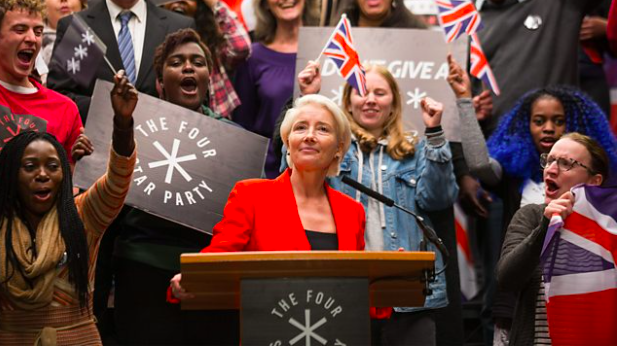
How do you cover the End of the World, as a journalist or artist or simply a citizen trying to make sense of the torrent of catastrophic events rushing by us and over us every day?
How do you speak the unspeakable when most people can’t handle the truth — and most of the powerful governments in the world (the US, Russia, China etc.) still minimize or deny the climate crisis, aided by state media (including Fox News)?

A gob-smacking six-episode British TV series called “Years and Years”— coproduced by the BBC and HBO — tried to do this when it debuted in the US last June.
Starring the brilliant Emma Thompson as a Trump/Boris-like bombastic celebrity politician, “Years and Years” takes TV viewers on a terrifying ride 15 years into the future, as political and military and economic and environmental calamities cascade toward what seems inevitably like The End. The first episode ends with President Trump, who’s been re-elected in 2020, launching nuclear missiles during a showdown with China. And yes, that’s just the FIRST episode.
“Years and Years,” which focuses on one very blended British family as it weathers the upheavals of modern existence, is riveting and even sometimes hilarious despite its horrific subject matter. But no one watched it. The show came and went on HBO without so much as a blip.
I vaguely remembered seeing an ad for it on HBO last spring, which I suddenly recalled because I happened to be thinking of watching the Emma Thompson movie “Late Night.” And so I went digging for it in the HBO catacombs. I’m now on episode three, and I’m hooked, but I must admit that I can’t binge on the show. It’s too emotionally overwhelming.
The climate change conundrum — how do you cover The End of the World — is also provocatively addressed by environmental writer Alan Weisman in The New York Review of Books. In a review of “The Uninhabitable Earth” (the title says it all) by David Wallace- Wells and “Falter: Has the Human Game Begun to Play Itself Out?” (ditto) by Bill McKibben, Weisman writes: “Climate scientists’ worst-case scenarios back in 2007 — the first year the Northwest Passage became navigable without an icebreaker (today you can book a cruise through it) — have all been overtaken by the unforeseen acceleration of events.”
As civilization rushes to extinction, asks Weisman, how do environmental writers overcome the natural human resistance to plug our ears — to bury our heads in the sand — to block out the doom and despair? And how do authors like Wallace-Well and McKibben even keep up with the global crisis, which is now speeding toward the abyss at exponential rates? (Last week it was the Bahamas’ turn to be obliterated.)
One of the most grim passages in Weisman’s important essay occurs when he recalls a conversation with a fellow environmental journalist, who is buckling under the avalanche of distressing news. How many stories can you write about the growing carbon overload in our atmosphere — and the corporate and political elites who have sacrificed the human race and countless other species on their altar of greed — before you darkly question your useless role in life as a journalist?
As Weisman recalls: “Once, a well-known journalist whom I won’t name remarked, as we commiserated over the infuriating, deteriorating state of affairs we were covering, ‘You know that someday we’ll ditch this journalism crap and become terrorists.’ I knew the feeling, but given the choice, I’ll opt for McKibben’s nonviolent activism.”
Thank God, literally, for Bill McKibben, who as a Christian and an equally devout climate activist, refuses to give up on humanity. And refuses to abandon his movement building for the path of terrorism.
The horrible truth is that terrorism often does work. The national security state succeeded enormously when its agents assassinated the Kennedy brothers and Martin Luther King, Jr. in the 1960s, thereby diverting the US away from peace and social harmony on a path of death and greed. The power elite understands you can change history by killing heroic visionaries. And because their rule is built on force and deception, they surround themselves with ranks of security.
But the most lasting and effective way to overthrow the power structure that is leading the world to its doom is not by resorting to its terror tactics. It’s by building a loud and unruly and unarmed people’s movement — like we are witnessing today on the streets of Hong Kong.
At some point during revolutionary upheavals, even the most militarized security forces protecting the citadels of power begin to melt away. That’s why the Peter Thiels of the world are planning island escapes.
McKibben is an activist first — that’s why he can’t give in to despair. He cofounded his climate change group, 350.org, with his Middlebury College students years ago, and it has since grown into a worldwide movement. As Weisman writes, McKibben is confident the climate movement will ultimately win. “But whether it wins in time, he acknowledges, is another matter.”

